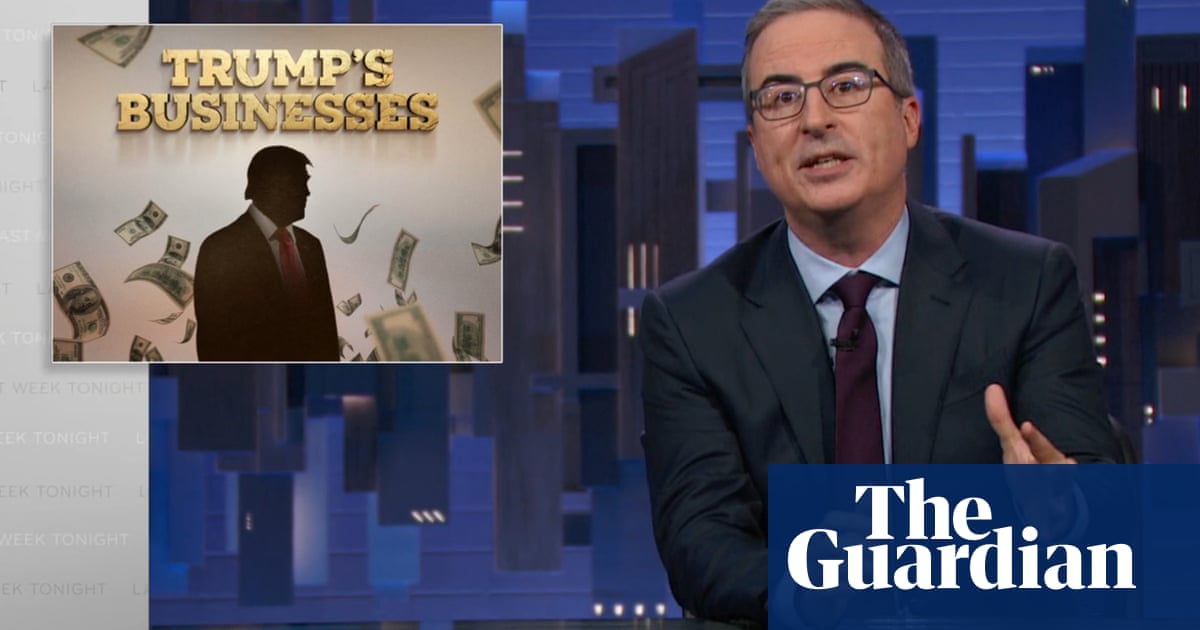Bussiness
John Oliver on Trump’s businesses: ‘Always operating at maximum greed’

On the final episode of Last Week Tonight before the 2024 election, John Oliver provided one final reason not to vote for Donald Trump: his many dubious businesses, which could guide his actions if elected president again. “We’ve talked all year about the many good reasons not to vote for him: his mass deportation plans, his shaping of the courts, Project 2025, everything he said or did before his presidency, everything he said or did during his presidency, everything he said or did after his presidency and the fact that it should be unconstitutional to have a vice-president named JD,” said Oliver.
But when it comes to making money as a former president, “Trump is in a category all his own”, he added.
Since leaving office, Trump’s hotels have announced deals in Saudi Arabia, Dubai and Vietnam. He’s hawked official Trump coins, a Trump-branded Bible, the “never surrender” high-top sneakers and “the ugliest watch I have ever seen in my life”, said Oliver. “It makes your wrist look like it’s having a midlife crisis. It looks like it was made by melting down King Charles.
“The fact Trump is willing to slap his name on random products is nothing new. It’s always been part of his MO,” he continued. “But the scope of his business ventures has actually escalated sharply,” which makes sense – since leaving office, Trump has racked up millions in legal expenses and has multiple judgments worth hundreds of millions against him. “Does nearly half a billion in penalties hanging over his head make the greediest man to ever live even greedier?” Oliver wondered. “Maybe, maybe not. After all, Trump is always operating at maximum greed, the same way the ocean is always operating at maximum wet.
“But it does mean that he is a little more desperate,” Oliver continued, because if Trump’s appeals fail and he doesn’t come up with the money, courts could order his assets – including his beloved Mar-a-Lago resort – seized and sold. The incentive is to make more money than even, and if he wins the election, “he’s got some troubling new ways to do that”, said Oliver.
Oliver recapped the guardrails during Trump’s first term which, unfortunately, weren’t so much legal guardrails as “norms that could be ignored”. Trump wasn’t required to release his tax returns or put his assets in a blind trust, so he didn’t. “If Trump is not required to do something, he’s not doing it,” Oliver noted. “It’s why he doesn’t say he lost the last election, or hug his children, or bother to learn the fucking dance moves to YMCA – for the love of God, move your arms above your shoulders, you human pot roast.”
Trump instead put his assets into a revocable trust that he could access any time, run by his sons Eric and Don Jr as well as the company CFO, Allen Weisselberg, who has gone to jail twice for lying under oath and dodging taxes.
Trump also blew past whatever laws did exist over presidential finances. The emoluments clause of the US constitution forbids the president from accepting money or gifts of any kind from foreign governments unless he obtains consent of Congress to do so, but his businesses made $7.8m from 20 foreign governments during his time in office. The top spenders were China, Saudi Arabia and Qatar.
“In any other universe, ‘president accepts money from foreign governments’ would be immediately disqualifying,” said Oliver. “Unfortunately, we live in this universe, where a candidate for president has been criminally indicted four times and convicted of 34 felony counts thus far, his running mate sees women as walking incubators and Reba McEntire still hasn’t done Hot Ones. This is not the ideal timeline!”
Trump’s financial violations during his presidency were the subject of several lawsuits, but he left office before they were settled, leading the supreme court to dismiss the matter as moot in January 2021. “Basically, he ran out the clock,” said Oliver. “So there is no evidence to suggest that Trump won’t carry on his personal enrichment during a second term.”
And he has more avenues to do so, if elected again. Since leaving office, Trump launched Trump Media & Technology Group, whose flagship product is Truth Social, or as Oliver called it, “the Maga version of Twitter, a phrase that is now totally redundant”. The company is now Trump’s highest-valued financial holding by far, though that does not reflect the lackluster performance of Truth Social, which is the 1,174th most popular website in the US. But because presidents are not bound by federal conflict of interest law, Trump could use the office of the president to artificially boost the stock to his personal enrichment. American companies seeking to curry favor could buy ads on the platform and foreign governments looking to do the same could buy shares of the company.
Public companies are still subject to some regulation; his ventures into crypto, on the other hand, are not. In the past two years, Trump has launched his own branded NFTs (non-fungible tokens), which have made him at least $7.2m off what Oliver declared “worthless pieces of shit”.
The Trump family has also launched a vague crypto-focused company called World Liberty Financial with Trump as its “chief crypto advocate”. The company “intends to build a platform that will allow users to trade, borrow and lend cryptocurrencies”, according to its “Gold Paper”.
If Trump wins, it’s expected that he will directly influence regulations – or lack thereof – of crypto companies, which one expert described as “conflict of interest 101”. “This is obviously extremely dangerous, but especially in a place that’s so new,” said Oliver. With crypto, Oliver summarized, Trump would not only be exploiting loopholes, but creating the loopholes in real time.
“It was clear before Trump was elected that he’d use the presidency to enrich himself,” Oliver noted. “But in a second term, the landscape is very different. We’re no longer talking about a tacky Florida country club that CEOs or foreign officials can visit for special access to the president. It’s two new companies in branches of technology that we’re still trying to figure out how to regulate, that could expose him to new levels of risk and provide avenues for people to funnel money to him and influence him.
“None of this is the biggest reason not to vote for him,” he concluded. “But it’s another good one to put alongside the many, many others.”









